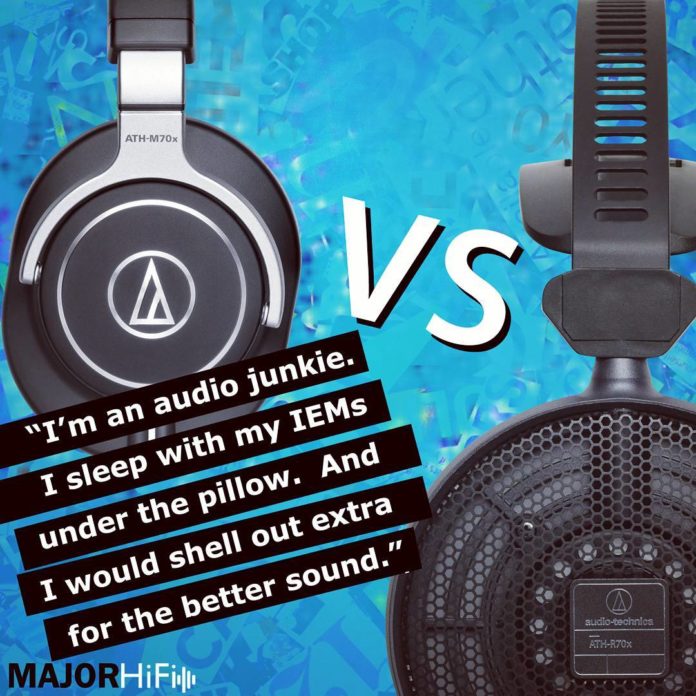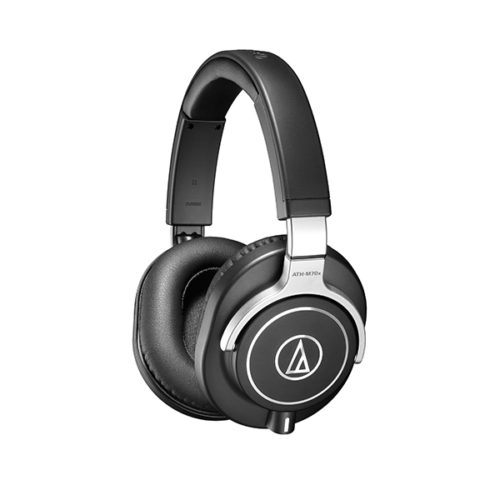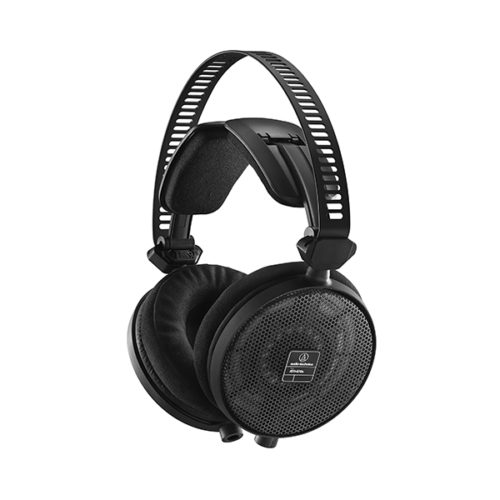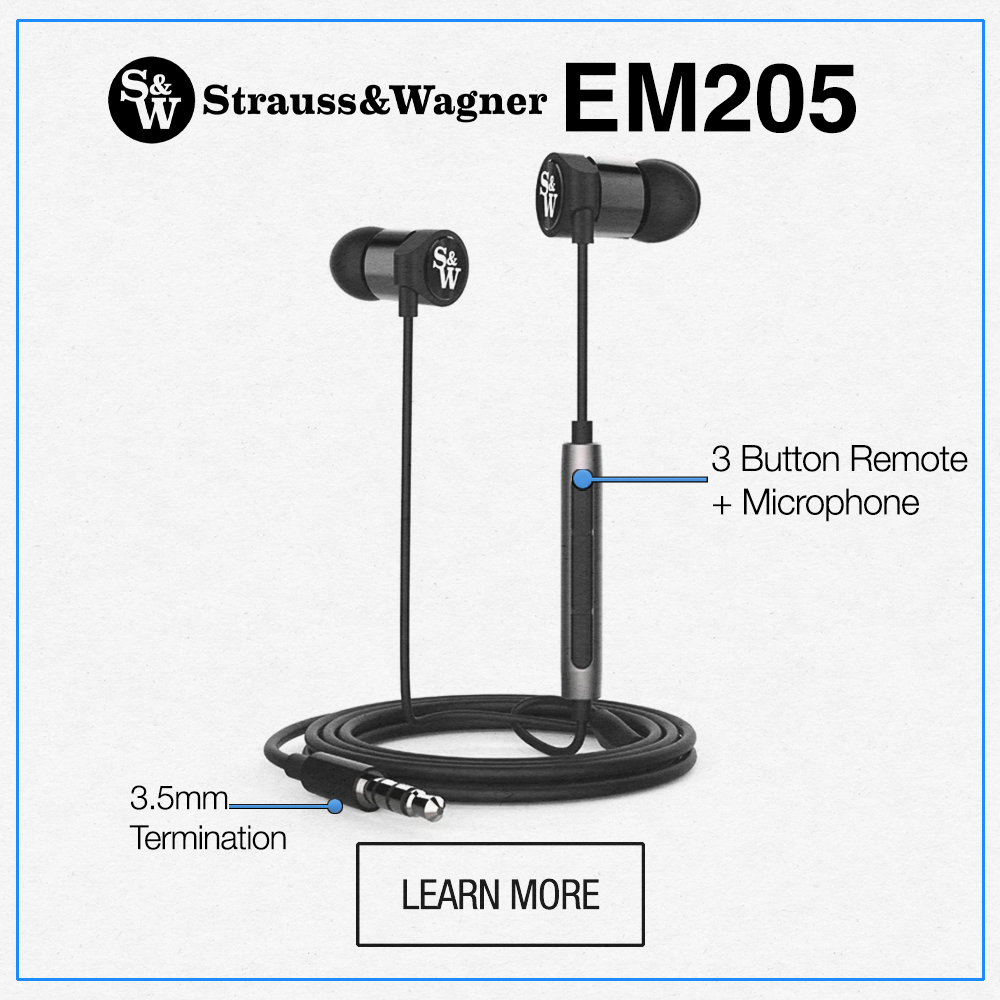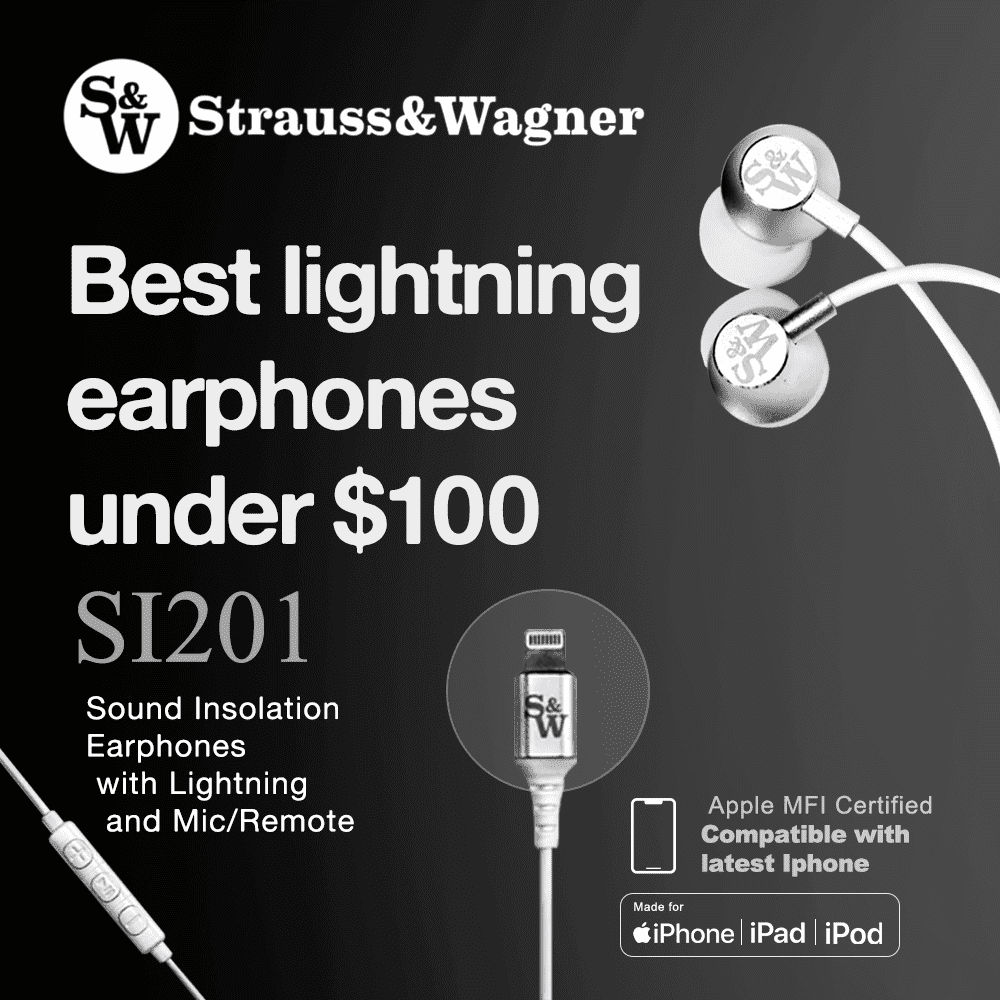They’ve been out for almost two years now, but there’s still some confusion regarding Audio Technica’s M70x and R70x headphones. Priced at $299 and $349, respectively, they’re more alike than they are different, with some key points standing out.
Audio Technica M70x vs R70x Comparison Review
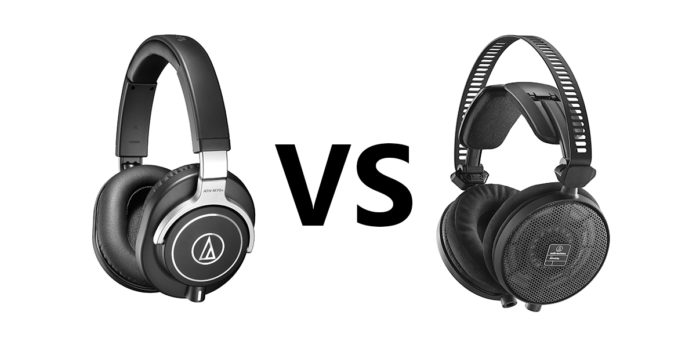
Build and Design
The M70x features a closed-back design with a single point of entry for the included removable cables – one long coiled, one long straight, and one short straight cable. It’s a mix of plastic and aluminum that sits easily on the head and does a good job of isolating bothersome noises around you.
The R70x, by comparison, is open-back with dual L/R entry, the cable is longer, and it’s predominantly made of plastic. Thanks to the lightweight design and the wing-style headband, it’s one of the most comfortable things I’ve ever put on my head.
M70x Specs
| Type | Closed-back dynamic |
| Driver Diameter | 45 mm |
| Magnet | Neodymium |
| Voice Coil | CCAW (Copper-clad aluminum wire) |
| Frequency Response | 5 – 40,000 Hz |
| Maximum Input Power | 2,000 mW at 1 kHz |
| Sensitivity | 97 dB |
| Impedance | 35 ohms |
| Weight | 280 g (9.9 oz), without cable and connector |
| Cable | Interchangeable cables: detachable 1.2 m – 3.0 m (3.9′ – 9.8′) coiled cable, detachable 3.0 m (9.8′) straight cable and detachable 1.2 m (3.9′) straight cable |
| Accessories Included | Carrying case, 6.3 mm (1/4″) screw-on adapter |
R70x Specs
| Type | Open-back reference |
| Driver Diameter | 45 mm |
| Frequency Response | 5 – 40,000 Hz |
| Maximum Input Power | 1,000 mW at 1 kHz |
| Sensitivity | 99 dB |
| Impedance | 470 ohms |
| Weight | 210 g (7.4 oz), without cable and connector |
| Accessories Included | Protective carrying pouch |
As you can see, these headphones sport the same driver size and frequency range, while also remaining close to one another in terms of sensitivity and even weight. The biggest differences come in the way of design – the M70x being closed and the R70x being open. Now I know you’re about to say, “But wait, one is dynamic and one is reference.” But in truth, they’re both pretty reference-y and less dynamic, but I’ll get to that in a moment. Because there is one more key difference between the two headphones that needs mentioning: impedance. The R70x is far and above harder to drive, and you will need an amp to get a decent sound out of it. The M70x, meanwhile, is pretty efficient, and could run off of your smartphone, computer, or portable music player. For this comparison, I paired the R70x with the Hifiman EF100 – a more than capable amp for these headphones.
Low End
In the low end, both the M70x and the R70x are strong performers. There’s much to be said for the bass, which is deep, detailed, and fairly lifelike. While it might suffer a tad on the M70x, due to the closed back design, it’s a minor qualm and one that shouldn’t worry you too much. Suffice to say, then, that either headphone would suit you well for just about any genre of music, whether you want to hear the low crawl of a cello in a Max Richter piece, or the badass drum work of Travis Barker.
Mids
Another high point to these headphones, and another area where both headphones pretty much stay neck-and-neck, the mids are simply fantastic. If I had to use just one word to describe them, it would be “rich.” So chock-full of detail and nuance, these mids are the mids that other headphones should aspire to. While it’s pretty much a tie here, there was an OMG-like quality to some horns when listening with the R70x.
High End
If there is a area of the frequency range where these headphones truly distinguish themselves from one another, it is the high end. There’s a lot of detail in there, to be sure, when listening with either headphone. But. While both remain lifelike, without clipping or getting too piercing on the highest of the high notes, the M70x sounds just a tad thin, as though the driver was having just a little bit of difficulty delivering everything as it should be. Perhaps this is more of an issue with the closed back design (or the one being open), which would make more sense, as these headphones seem to sport an almost identical driver.
Soundstage
Amazing. Everything has a place, every not is coming from that place it occupies, and things don’t bleed or turn to mush in your ears. Of course, the open-back R70x has a slight edge here, but don’t be so hasty to write the M70x off forever – sure it has less soundstage, but it’s closed-back, too. And speaking of closed-back designs…
Closed vs Open
Which one is best? For pure sound quality, I always tell people to go with open-back. And if I ever doubted myself for giving that recommendation, the R70x only reaffirms my belief that open-back is best-back. Even if it leaks or has low isolation. Even if it requires a beast of an amplifier. Even if it is $50 more expensive than its almost-identical closed-back counterpart. But that’s just me, guys and girls. I’m an audio junkie. I sleep with my IEMs under the pillow. And I would shell out extra for the better sound.
But it’s not necessarily such an improvement in sound that you should opt for the open-back R70x, especially if you need the isolation.
Overall Impressions
Both the M70x and the R70x are bitchin’ ‘phones. Seriously, these headphones box skew towards reference-class. They sound rich, accurate, and phenomenal, and they’d be great for any genre where you’re looking to get that “original intended sound” that so many other headphone brands claim to chase.
The R70x might be harder to drive, but there’s a little better quality there, and a little lighter (more comfortable) build.
The M70x, meanwhile, will work fine with portable players, computers, and whatnot, while also isolation you from the outside world. Sure sound might not be as good as it is on the R70x, but we’re still willing to give this headphone props.
Recommendations
Need the best? Don’t care about the extra $50 plus the cost of an amp? Love open-back sound? Go ahead and treat yourself – get the R70x!
Want something more portable and commute-friendly? Want almost 95% of the same sound as the R70x? Need to hide the fact that you’re listening to K-Pop in the office? Opt for the M70x – you’ll love it.
Compare the ranking of various headphones, earbuds and in-ear monitors using our tools.
Discuss this, and much more, over on our forum.
---MAJORHIFI may receive commissions from retail offers.


